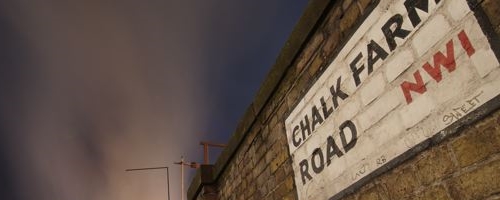
Picture by tonyhall: Chalk Farm Road Fire
Chalk Farm, perhaps inevitably, isn’t as exciting as it sounds. During the day there’s nothing but fields of scrubby brassica; and at night, when the chalkpullers are working, spectators are banned. The harvest takes place on cloudy nights, undocumented, under cover of a tarp rolled out between the walls. It’s best to be safe. The young chalk bruises so easily that the flash of a torch or a camera could ruin a night’s work.
In the old days they did it all by touch: chalk harvesting was the first resort of blind children who lacked the musical aptitude for piano tuning. Nowadays there are night-vision goggles, but Rashamma is a holdover from the forties, stalking the rows with her fingers outstretched, squatting down to worm them into the ground.
The chalk is soft and malleable. In the bounty years of the 50s it grew to maturity so fast, so lithe, that she could wind it around her waist as she went. Even now she can pull out strands two metres or more before they snap, though she always carries them with arms outstretched, as straight as she can, and lays them on pallets for wheeling into the warehouses.
The processing plants are dark as well, and the women recognise each other by the sound of footsteps: heels or sneakers, quick or slow. Hannah walks in waltz time, heavy on the ground with every third step, and nobody notices in the city, but here they hum “My Favourite Things” as she passes.
She adjusts the colour settings, upping the red and green. A long time ago, pink chalk came from harvesting under a red moon; then, for hundreds of years, it came from sunlight cast through red silk. Nowadays there are numbers and charts and graphs, but the process still relies on instinct. Different harvests take the light in very different ways.
Hannah thinks, sometimes, about trying to distill her intuition into a set of rules, even an automated process, but no company would fund that level of research and development, not now. Blackboards and hopscotch are all but gone, chalk farming is a dying industry; ten percent of Britain’s chalkfields are uprooted every year to make way for whiteboard markers.
Shame, really.
She shifts the filters again, and then, finally satisfied, pulls the cord for a two minute exposure. No need for her to fret: the last fields of the chalk farms will last out her working life. Carpenters and dressmakers and half-hearted revolutionaries will keep them going for a while yet. And there’s part of her that relishes the gradual destruction, just for the glory of it, the bulldozers sent to rake up crops in the foolhardy day, the explosions of dust and colour as new chalk is overturned into sunlight.
0 Responses
Stay in touch with the conversation, subscribe to the RSS feed for comments on this post.